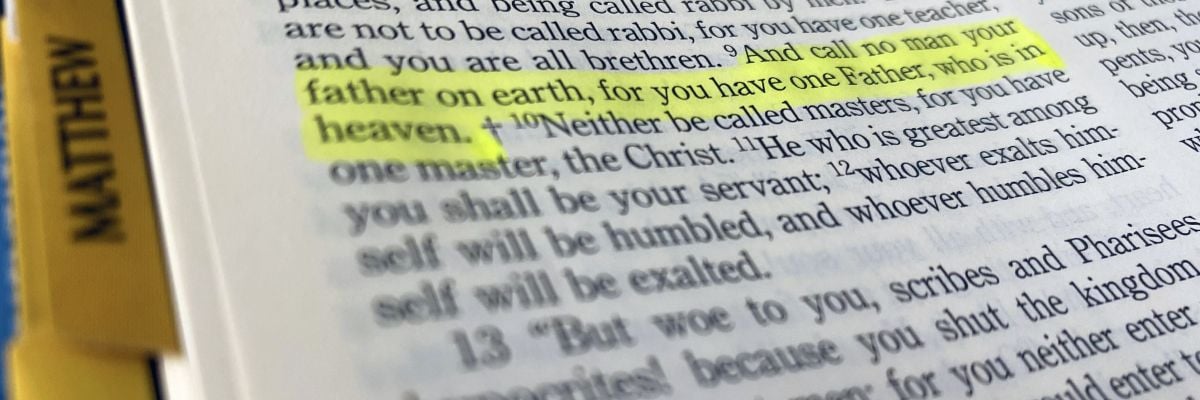
I once met a man whose decision to leave the Church began when door-to-door missionaries pointed out Matthew 23:9: “Call no one your father on Earth, for one is your heavenly Father.” When Catholics address priests as “father,” are they disobeying the Word of God, or is there a way to understand this salutation that accords with the whole of the New Testament?
It’s not out of place to question Protestants about their own adherence to this text. Many of their churches have Sunday school teachers. Often their ministers have advanced degrees and are referred to as “doctor.” The problem is that in the verse following the one in which the title “father” is forbidden, the titles “teacher” and “doctor” (which comes from the Latin word doctor and means “teacher”) are forbidden: “Do not call anyone teacher, because your teacher is one, the Christ” (Matt. 23:10). Similarly, the title “rabbi” is forbidden.
Thus it might appear all of us—Catholics, Protestants, Jews—are in the same boat. I do not propose to condemn these honorific titles, but to show there is a solid basis in the Bible for calling men father, teacher, doctor, or rabbi, rightly understood.
In Matthew 23 our Lord forbids us to call anyone rabbi, father, or teacher if that title in any way diminishes our dependence on God. He echoes the Old Testament teaching that obeying God is more important than maintaining or exalting family ties. The Old Testament is severe about this: The Levites are commended for executing anyone who worshiped the golden calf, whether the malefactors were the Levites’ fathers, brothers, or children (Deut. 33:9; Ex. 32:27-29).
Kinship ties, no matter how close, were not to prevent anyone from stoning family members who enticed others to commit adultery (Deut. 13:7-10). Any child who struck his parents (Ex. 21:15), cursed them (Ex. 21:17; Lev. 20:9), or was incorrigible (Deut. 21:18-21) was to be killed, presumably by the parents or other relatives. Despite the high value placed on family life in ancient Israel, divine law and order took precedence over kinship ties.
Jesus’ teaching and action reflect a similar tension between the priority of God over kinship and the high value of the family. When he was twelve, he “had to be about his father’s house,” even though it caused Joseph and Mary anguish (Luke 2:48-49). Before he sent his disciples on their first mission he said, “Anyone who loves father or mother more than me is not worthy of me, and anyone who loves son or daughter more than me is not worthy of me” (Matt. 10:37).
On the other hand, when the rich young man asked Jesus what he must do to inherit eternal life, our Lord replied, “Honor your father and mother” (Matt. 19:19; Luke 18:20). He excoriated the Pharisees for neglecting this commandment (Mark 7:10-13). Following Jesus, the early Church taught children to obey their parents and parents to treat their children well (Eph. 6:1-3; Col. 3:20-21).
These passages indicate the tension between our Lord’s call to place God above family and the necessity to maintain love of family. The same principle applies to our attitude toward teachers and Church leaders such as priests. No human being can approach the authority of God, but teachers and Church leaders deserve respect and honor. One of the ways Scripture calls us to honor Church leaders is to call them “father.”
An examination of the New Testament shows “father” is a title applied to God, to the ancestors of Israel, to fathers of families, to Jewish leaders, to Christian leaders, and even to the Devil (the Father of Lies). Every New Testament book except 3 John uses the word “father” at least once.
As the table illustrates, the New Testament usually (63% of the time) uses “father” as a reference to God the Father. Matthew, Luke, John, Acts, and 1 John account for 189 out of 252 occurrences with this meaning. The second most common use refers to human fathers, both from Israel’s past and contemporary parents.
(Certainly Christians agree that Jesus’ prohibition against calling anyone “father” does not preclude the honor due to natural parents, living or dead, even though that could be taken as the literal meaning of his command, though not even the most literalistic Fundamentalist takes it that way.)
Those Christians who are troubled by the title “father” being given to Catholic priests say it is an honorific that belongs only to human parents or to God, not to religious leaders. This objection can be answered from the Bible: We have six New Testament books which show us that Jewish or Christian leaders may be addressed by this title.
Nearly half the uses of “father” in the Acts of the Apostles appear in Stephen’s speech in chapter 7 (17 out of 36 uses). He refers to the ancestors as fathers, both individually and collectively (16 times), and once he addresses his audience as “brothers and fathers.” Paul addressed a crowd of angry Jews in the Temple as “brothers and fathers” (Acts 22:1). These are places in which “father” is given to Jewish religious leaders. The title is also given to Christian religious leaders.
The first New Testament book ever written, 1 Thessalonians, refers to Paul “as a father exhorting his own children” (1 Thess. 2:11). By this usage Paul places himself in the role of a spiritual father. In fact, he insists on being called the spiritual father of the Corinthians when he says, “You have in Christ ten thousand teachers, but not many fathers, because in Christ Jesus I have begotten you through announcing the gospel. Therefore I exhort you to become imitators of me” (1 Cor. 4:15).
Preaching the good news constituted Paul’s fatherly begetting of children, making him their spiritual father. He requests they imitate him, not only in good behavior but in bringing others to spiritual rebirth.
In 1 John a group of Christian men are addressed as fathers: “I write to you, fathers, because you have known him who is from the beginning” (1 John 2:13-14). By themselves these verses give us warrant to address Church leaders as “father.”
We have, then, a clear authorization from Scripture to call our parents and religious leaders father or mother. It is true Christ gives us an admonition not to let any human being become as important as God the Father or Christ our teacher and rabbi, yet neither should we deny that certain people in the Christian community are our spiritual parents.
This derives from the nature of Christianity, which offers not a philosophy or ideology, but new life and rebirth in Christ, modeled on birth into family life and its inheritance: “Blessed be the God and Father of our Lord Jesus Christ, who, according to his great mercy, gave us rebirth into the hope of life through the resurrection of Jesus Christ from the dead, into an immortal, undefiled, and unfading inheritance, kept for us in heaven” (1 Pet. 1:3-4).
Peter notes that we “have been reborn, not from mortal seed, but immortal, through the living and enduring word of God” (1 Pet. 1:23). The one who speaks this living and enduring word of God is like a spiritual father to us, playing an essential role in our rebirth in Christ. This means the priest is the prime candidate for the title of spiritual father.
By his training and ordination he is commissioned by the Church to proclaim the gospel. His office charges him to speak for the Church, not for his own private opinions. He ministers the sacraments. The words spoken by him at baptism give rebirth by water and the Spirit, making the baptized a member of the Body of Christ. This is a fatherly act.
The living and enduring word of God spoken at the Eucharist transforms bread and wine into the Body and Blood of Christ, offering the family of God the spiritual food necessary for eternal life (John 6:51-56). This, too, is fatherly.
Fatherly also is a priest’s reconciling penitents in confession, overseeing the exchange of marriage vows, anointing the sick or dying. The fatherly role of the bishop is a special privilege, strengthening the faithful in confirmation or ordaining priests to father the community of Christians.



